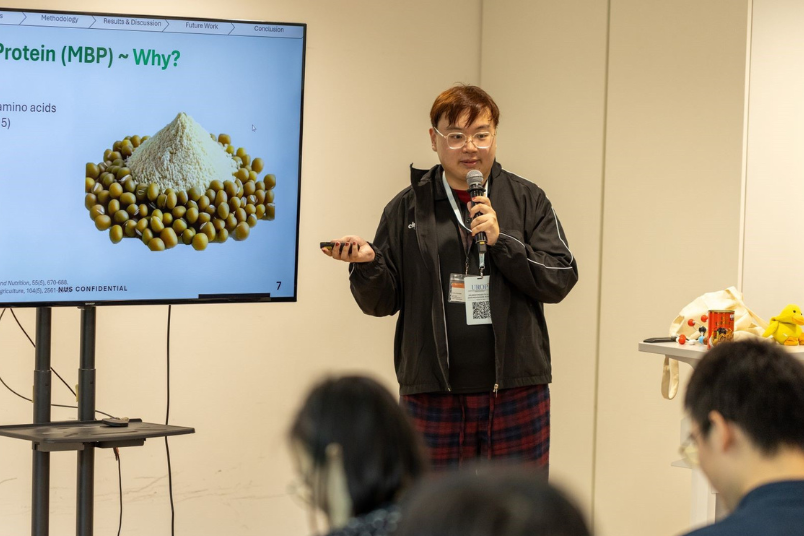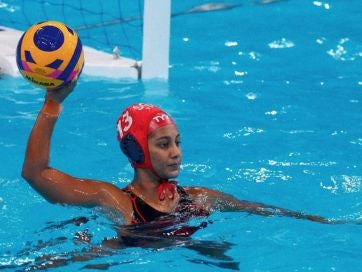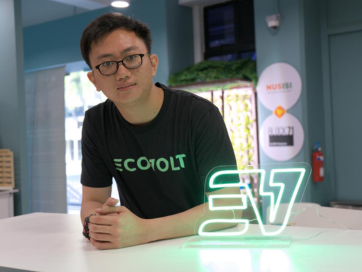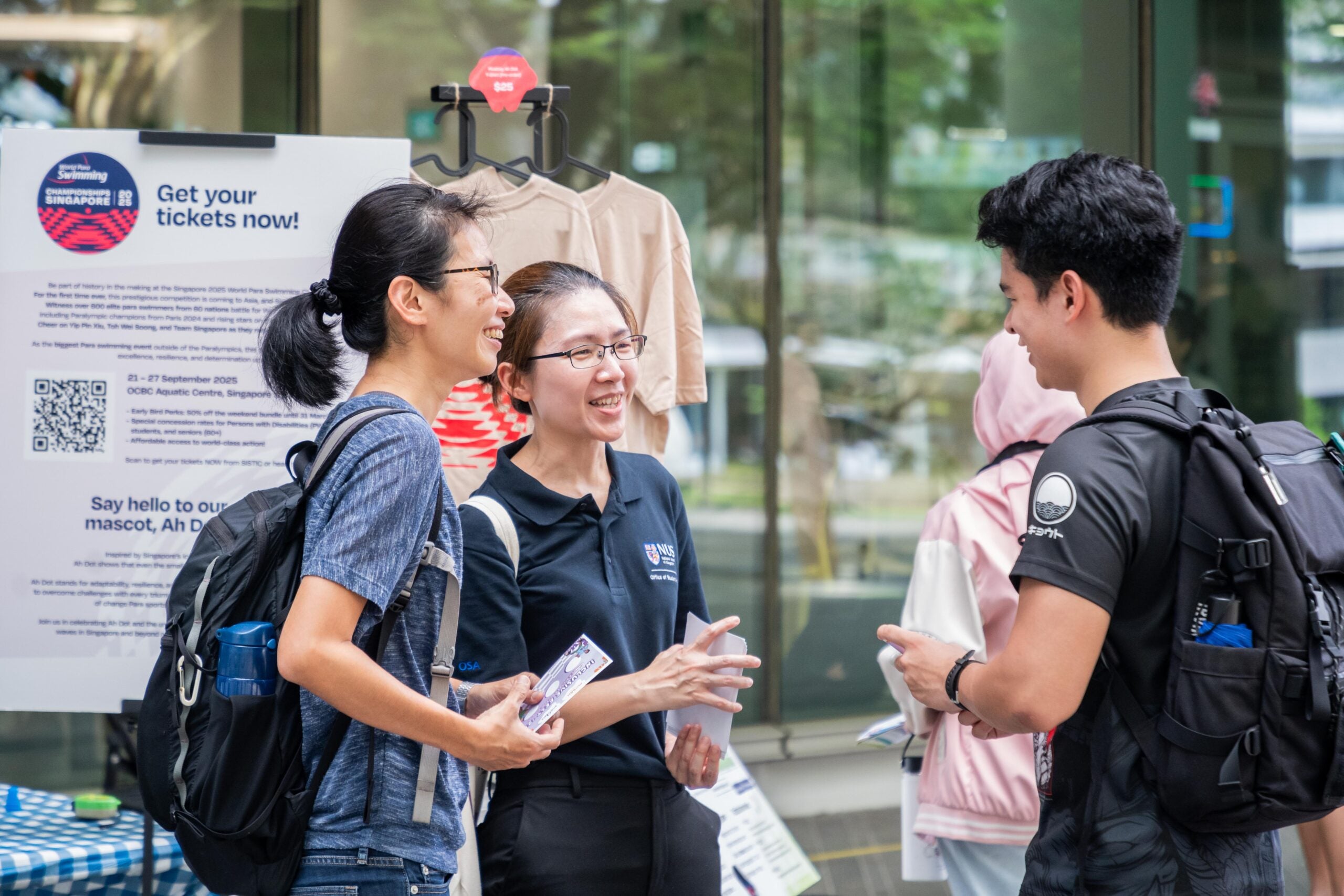Balancing research, leadership, and self-discovery is no small feat — but Alpha Ho Ee Heng (Science ’25) did exactly that, growing and thriving at NUS alongside navigating life with autism spectrum disorder (ASD) and dyslexia. In the process, he emerged a leader — from heading the NUS American Chemical Society Student Chapter (NUS ACSSC), to championing inclusivity and accessibility with NUS Enablers.
Post-commencement, Alpha will embark on further study in Chemistry as a PhD candidate. OSA caught up with him as he reflects on his time at NUS, the support systems that made a difference, and his hopes for a more inclusive future.
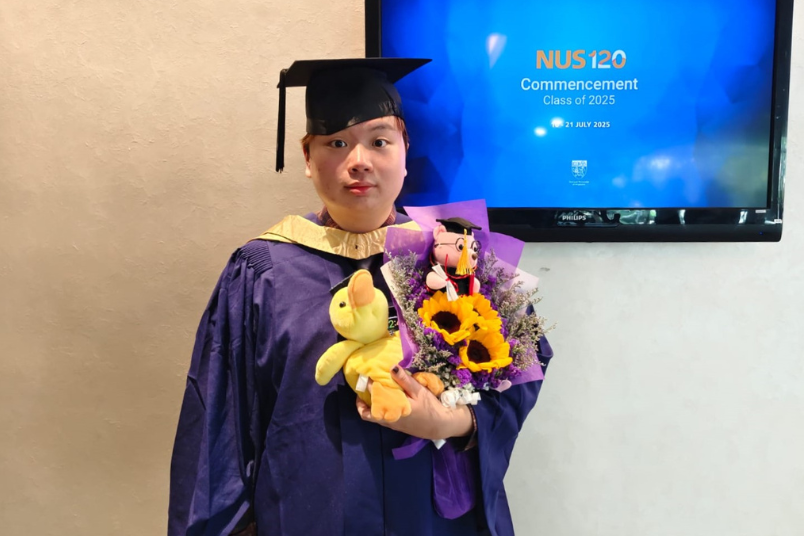
Alpha at his Commencement ceremony, ready to begin his next chapter as a PhD candidate.
OSA: What are some of your proudest moments at NUS?
I won the Best Oral Presentation Award at the UROP+REx Conference 2025. It was a platform for aspiring student researchers to present their work and engage in discussions with like-minded peers and academics. The award is recognition of my ability to communicate my work to a lay audience and showcase my creativity. This achievement inspires me to work on refining my presentation skills for various audiences, which will be beneficial to my PhD studies.
OSA: NUS ACSSC promotes outreach and professional development in Chemistry. Tell us about your involvement in it.
I served as the Vice Publicity Head for a year, then as President for two years. As President, I managed 12 committee members, many of whom were international students who brought unique insights and perspectives to the chapter. A memorable experience from my presidency was organising the NTU Odyssey-NUS ACSSC-HSA Forensic Science Workshop cum Competition 2024, a forensic science workshop and competition organised in collaboration with NTU and the Health Sciences Authority. This was our first collaboration post-Covid, and it strengthened our ties with the other chapters and allowed us to reach out to a wider audience.
I also represented NUS ACSSC at the American Chemical Society (ACS) International Chapters Leadership Summit, held in Kuala Lumpur in 2023. One speaker recounted how his involvement in a student chapter led him to serve on the main ACS council. That really resonated with me — it showed how student leadership can evolve into meaningful global contributions. I aim to continue to engage with the international scientific community after my studies.
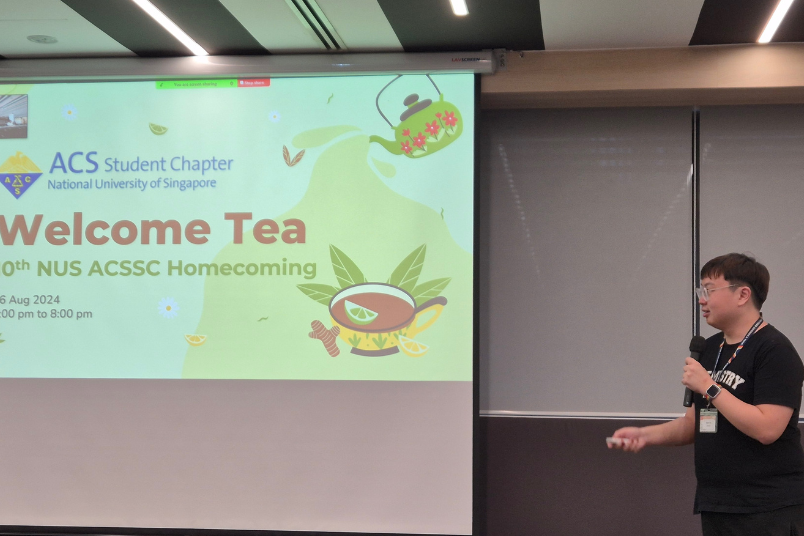
Alpha welcoming new NUS ACSSC members at the NUS ACSSC Welcome Tea and 10th Anniversary Homecoming 2024.
OSA: As a student with ASD, how has your academic journey at NUS been like? What were some of the barriers you faced and how did you work through them?
My academic journey has been challenging, but I’ve also learnt a lot and grown as a person. Having ASD led me to realise I process and approach things differently from my peers. I struggled with social anxiety and mood swings and had moments of deep self-doubt. The turning point happened in Year 3, when I started penning down my thoughts to reduce mental clutter and refocus on my personal goals, such as pursuing a PhD. Learning not to compare myself to others wasn’t easy. It is still something I work on today. However, I’ve become more intentional about recognising my strengths, managing my limitations, and using both to stay motivated and achieve my goals.
OSA: What measures at NUS helped support your learning and made your experience more inclusive?
Access arrangements in NUS have made my learning more inclusive. Since I’m dyslexic, I take a longer time to read and process information than my peers. When I first entered NUS, the Student Accessibility Unit (SAU) from OSA reached out to me and arranged a visit with the Student Support Officer at the Faculty of Science . That made it easier for me to explain my disabilities and receive the right support, such as assignment deadline extensions and extra time for exams. Such arrangements really helped me to keep up every semester.
OSA: Having benefitted from a more accessible and inclusive learning environment, how did this influence your work with the NUS Enablers?
I was a Programme Director back in Year 1 in 2022. It was still during Covid restrictions, and I was tasked to organise a virtual Human Library with simulation games. This event helped raise awareness for dyslexia and ADHD to the student body. We invited two speakers with these conditions to share their journeys and struggles. The simulation games were designed to enable participants to experience daily life with dyslexia and/or ADHD.
Organising the event was no easy feat. I remember wanting to give up a couple of times, but Teo Zhi Xiong, my Staff Advisor from SAU, encouraged and persuaded me to continue the project. In the end, the event met its objectives, and our participants enjoyed themselves.
The following year, I was invited back for a Human Library session, this time as a speaker. It was quite a pleasant surprise to witness how much my juniors have learnt and grown in their time with NUS Enablers.
OSA: Beyond NUS Enablers, what other advocacy work are you involved in, in or outside of NUS?
Outside of NUS, I am involved with TomoWorks as a two-time recipient of their Talent Uplift Programme Scholarship. Together with other scholarship recipients, I took the initiative this year to spearhead a workshop about healthy eating on a budget, targeted at migrant workers. Organising this workshop allowed me to connect and collaborate meaningfully with fellow university students with special needs. Although each of us had our own struggles, we were able to support each other and work effectively to organise a successful workshop.
I’m also a freelance instructor for the Taster Course (TaCo), where we give pre-university students a taste of university life. I’ve been giving taster courses to Hwa Chong institute students for two years now.
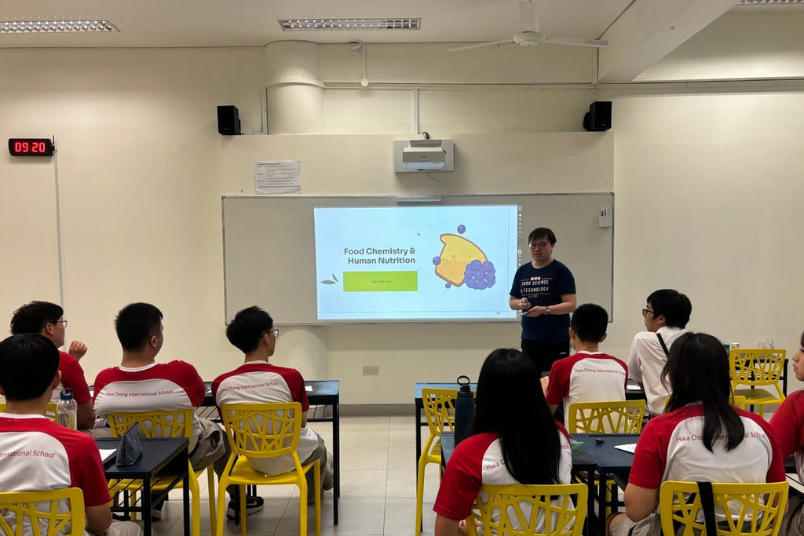
Alpha sharing his experiences as a Food Science and Technology major with Hwa Chong Instituition students.
OSA: SAU has just turned 10 in 2025. What do you think of the work SAU has done since you joined NUS? What are your hopes for SAU moving forward?
The SAU has played a pivotal role in helping students, especially freshmen anxious about the new environment and transitioning into university life, to enjoy university life and prioritise their mental wellbeing alongside academic success. They’ve done a great job supporting students with disabilities, not only through accessibility features in accommodations, but also through student support programmes, which have been both empowering and affirming.
As mental health awareness increases, I hope that SAU will continue to support the mental wellbeing of students. By prioritising mental health, listening to student voices, and ensuring access to timely support, we can build a truly inclusive and empowering campus environment for everyone.
OSA: Any words of advice for fellow students with special needs on how to make full use of their time as undergraduates at NUS?
You are not less because of your condition. Do not be afraid of the challenges ahead; instead keep an open mind and be the best version of yourself. When you look back, you will be proud of how far you’ve come.
This is the final instalment of a three-part series celebrating the student life achievements of our graduands from the Class of 2025. Click here for info on NUS Commencement.
Share:
Contributor
Office of Student Affairs


